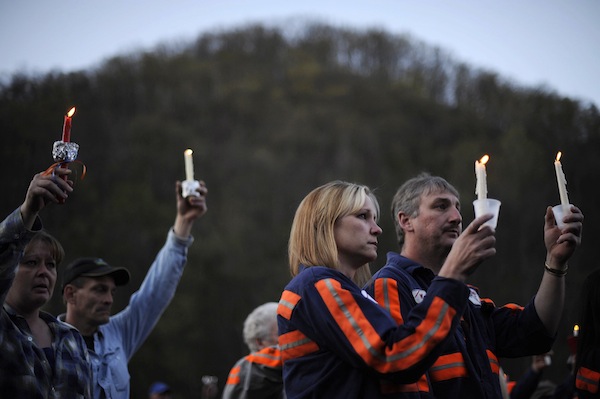Former Miner Details Dangers of Massey Mines
I knew that if I said something, I wouldn’t have a job tomorrow, says former miner Chuck Nelson.
Jul 31, 20203.3K Shares674.6K Views
Mourners held a vigil after the Upper Big Branch mine explosion in West Virginia. (EPA/ZUMApress.com)
Beckley, W.Va. — As lawmakers mull better ways to prevent mining accidents following this month’s deadly blast in Southern West Virginia, one long-time veteran of the Appalachian mines has a suggestion:
[Environment1]“Break down these criminal enterprises like Massey Energy,” said Chuck Nelson, who worked for Massey in underground mines for most of the 1990s. “That is the best possible solution.”
Massey, the Virginia-based coal giant, is facing intense scrutiny in the wake of the April 5 explosion at its Upper Big Branch Mine south of Charleston, which killed 29 miners. Prior to the blast, federal inspectors had cited the project for more than 120 safety violations this year alone, including two citations issued the day of the explosion. Dozens of other Massey mines in Appalachia have racked up thousands of similar violations, leading critics on and off Capitol Hill to accuse the company of putting profits above the well-being of its workers — a charge vehemently denied by Massey officials.
Nelson, who left Massey in 2000, says that’s simply the company’s business model. In an interview with TWI from his Raleigh County home, the retired Nelson described a company culture — perpetuated by higher-ups — that systemically disregarded safety measures in the name of greater coal production. For example:
- Mine ventilation systems utilize so-called line curtains to direct the flow of fresh air into underground work chambers in order to prevent highly combustible methane gas from accumulating. Massey, Nelson said, encouraged the miners to jerk down those curtains lest they get in the way of the heavy equipment and slow the process of harvesting coal.
- Mine operators are also required to dilute combustible coal dust through a process known as rock dusting (which usually means dousing walls with limestone dust). Rock dusting should occur throughout the day, but at the Massey mines, Nelson said, rock dusting was commonly done only at the end of the shift.
- As a protection against black lung disease, inspectors can ask miners to carry dust pumps gauging the levels of coal dust in a work chamber. It wasn’t uncommon in Massey mines, Nelson claimed, to hang those pumps near ventilation fans instead, where they’d detect only the fresh air flowing in from above-ground.
When miners learned that government inspectors were headed into a mine, Nelson added, they would race to hang curtains, fling the rock dust and generally try to get the place in compliance with the safety rules. When the inspectors left, “we were back to doing the same old business as usual.”
“This happened every day that I worked with Massey,” said Nelson, now a volunteer with the Ohio Valley Environmental Coalition. “I worked at six different Massey mines and every single one of ‘em operated the same way.”
Because almost all of Massey’s mines are non-union, workers fear the repercussions if they report safety issues, according to several leaders of the United Mine Workers of America who spoke with TWI Tuesday. Gary Young, a senior representative with the UMWA’s District 29 office in Beckley, said that Massey workers in particular have the threat of unemployment hovering over them. They know, Young said, “that there are 300 people outside ready to take [their] spot.”
Nelson — who worked in union-backed mines for nearly 20 years before moving to Massey for roughly eight — echoed that sentiment. “I knew that if I said something, I wouldn’t have a job tomorrow,” he said. Nelson said he lost favor with the company a decade ago when he complained about the damage being inflicted on his home by a Massey-owned mountaintop removal project. (The outspoken activist has since moved to another hollow.)
Don Blankenship, Massey’s hard-nosed CEO, has defended the company’s safety record, arguing that the number of violations it’s racked up — particularly at the Upper Big Branch Mine, where this month’s tragedy occurred — were comparable to other operations of similar size. Safety violations, he saidin the immediate wake of the blast, are “a normal part of the mining process.”
More recently, Blankenship that the company’s long record of safety violations is irrelevant to the recent disaster. “When somebody says, ‘Did the violations have anything to do with the accident?’ — they should not,” he told Charleston’s Daily Mail. “Because every violation is abated and agreed to by everyone before there is any further mining. So you would not think that any violation of the past had any relevance.”
The White House, however, disagrees, and last week President Obama announcednew steps for mining reform, including the immediate re-inspection of all mines with a troubling safety record. Congress is jumping in as well, with both the Senate and the House scheduled to hold hearings on mining safety shortly.
Meanwhile, President Obama and Vice President Biden will attend a memorial service in Beckley Sunday for the 29 miners killed this month. Obama himself will deliver the eulogy. There are many in Raleigh County who are hoping that, to prevent the next disaster, he’ll offer more than words.

Hajra Shannon
Reviewer
Latest Articles
Popular Articles
